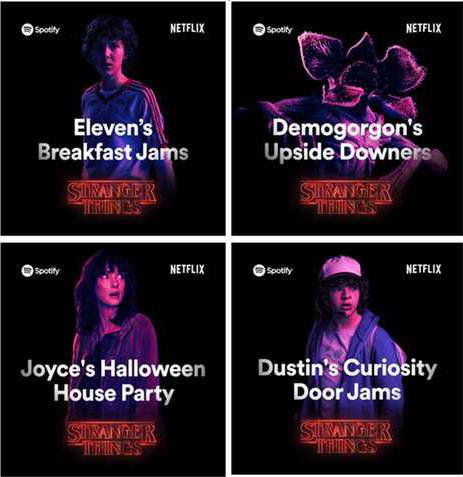People across the world celebrated the release of Stranger Things 2 on Friday.
The Netflix original show released its second season overnight, leading to the series leading the way on the U.S. trending list on Twitter.
Most Americans will likely be stuck at work today without the chance to binge watch the show. But Spotify, with its latest playlist trick, wants to help feed your Stranger Things hunger with a new trick.
Spotify and Netflix have partnered together to bring character playlists to its service. The music streaming service essentially discovers which character you have most in common with based on your Spotify listening habits and preferences and then sends you a playlist curated by the fiction character, according to a press release.
Users can match with Eleven, Dustin, Steve and many other characters, including the monstrous Demogorgon, the villain of the first season.
Another cool trick: Sharing the playlist on social media will flip your screen to The Upside Down, the dark and nefarious alternate world seen in Stranger Things.
Head to spotify-strangerthings.com for a look.
Spotify released a separate Stranger Things easter egg earlier this week that turned your screen into the Upside Down if you listened to the shows soundtrack, according to the Deseret News.
The new season will continue the story of a group of kids who find their world racked by supernatural forces in their town. So far, the show has received positive reviews (though it does lean on many season 1 jokes and references).
The Netflix original show released its second season overnight, leading to the series leading the way on the U.S. trending list on Twitter.
Most Americans will likely be stuck at work today without the chance to binge watch the show. But Spotify, with its latest playlist trick, wants to help feed your Stranger Things hunger with a new trick.
Spotify and Netflix have partnered together to bring character playlists to its service. The music streaming service essentially discovers which character you have most in common with based on your Spotify listening habits and preferences and then sends you a playlist curated by the fiction character, according to a press release.
Users can match with Eleven, Dustin, Steve and many other characters, including the monstrous Demogorgon, the villain of the first season.
Another cool trick: Sharing the playlist on social media will flip your screen to The Upside Down, the dark and nefarious alternate world seen in Stranger Things.
Head to spotify-strangerthings.com for a look.
Spotify released a separate Stranger Things easter egg earlier this week that turned your screen into the Upside Down if you listened to the shows soundtrack, according to the Deseret News.
The new season will continue the story of a group of kids who find their world racked by supernatural forces in their town. So far, the show has received positive reviews (though it does lean on many season 1 jokes and references).








